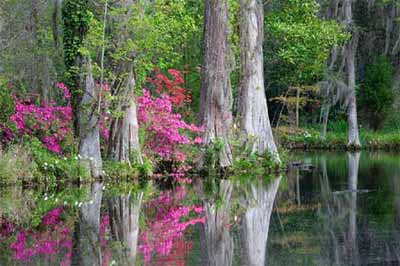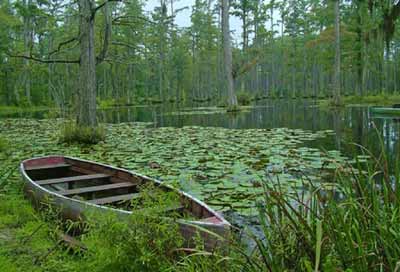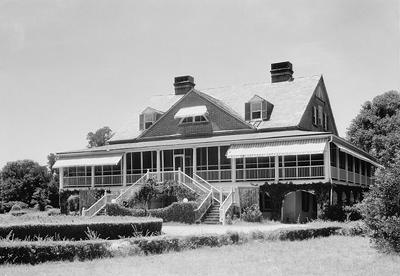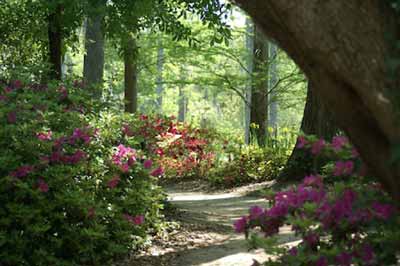Dean Hall Plantation – Moncks Corner – Berkeley County

— Cypress Gardens, the former Dean Hall Plantation © Robin Seabury, 2007 —
(Do Not Use Without Written Consent)
Basic Information
- Location – Western branch of the Cooper River, Moncks Corner, St John's Berkeley Parish, Berkeley County
Located at the end of Cypress Gardens Road east of US 52
- Origin of name – Named for Dean, Scotland, homeland of the first owner, Alexander Nesbitt
- Other names – Nesbitt House
- Current status – Cypress Gardens is located on the original rice fields of Dean Hall Plantation.
Timeline
- 1720 – Earliest known date of existence
Alexander Nesbitt was given 3,100 acres on the east side of the Cooper River. At this time he was living in England.
- 1725 – Alexander Nesbitt came to the Carolinas and began to build a house on his property. He named the plantation Dean Hall after his homeland Dean, Scotland (1, p. 3).
- 1732 – Alexander Nesbitt married Mary Rutherford. They had three children: Henry, John, and Alexander.
- 1744 – Alexander and Mary decided to return to England. The plantation was conveyed to Anthony White. It is assumed that he was to take care of plantation matters while they were gone.
- 1750 – Alexander and Mary Nesbitt returned to the Carolinas.
- 1753 – Alexander Nesbitt died. He was buried in St Phillip's churchyard. His will stated that his real and personal property were to go to his eldest son, Henry. However, Henry did not live to inherit the property and it was divided between Alexander's two other sons, John and Alexander (6, p. 88).
It appears that neither son lived on the plantation. However, their mother, Mary, continued to live on the plantation (6, p. 89).
- 1778 or 1779 – John Nesbitt died and his two sons went to live with their grandmother at Dean Hall (6, p. 89).
- 1782 – With the Revolutionary War still going, the Nesbitt's property was confiscated because of their allegiance to the British crown. It was placed on List No. 1 of Confiscated Estates (6, p. 89).
- 1783 – Dean Hall was removed from the Confiscated list (6, p. 89).
Around this time the two grandsons, John and Alexander, were sent off to school in England (6, p. 89).
- 1821 – John Nesbitt, the grandson, sold the plantation consisting of 3,100 acres to William Augustus Carson (1, p. 3).
- 1827 – A new house was built at Dean Hall. It was made of brick manufactured at Medway Plantation. William Carson also dramatically improved the rice fields (1, p. 3).
- 1841 – William Augustus Carson married Caroline Petigru. They had two children: William and James.
- 1842 – Dr. John Irving wrote a book about the families and plantations along the Cooper River. He described Dean Hall as follows:
"It resembles a well ordered village more than that of a single plantation. The residence of the proprietor - the condition of the fields - the banks - the white and cleanly appearance of the negro houses - the mill and thrashing machine in complete order, all excite a strong feeling of admiration, and stamp at once the proprietor as an experienced and skillful planter" (7, p. 25) .
- 1856 – William Augustus Carson died. The plantation was later sold by his estate's executors to Elias Nonus Ball for Confederate Securities (1, p. 3) (9, p. 234).
- ? – Caroline Petigru Carson, William Carson's widow, filed a law suit to recover Dean Hall as Confederate Securities had no value (7, p. 27) (9, p. 234).
- 1883 – The US supreme court declared Caroline Petigru Carson owner of Dean Hall finding that the executors of her husband's estate had no right to accept anything except legal tender for the sale of the plantation (7, p. 27) (9, p. 234).
Caroline's sons, William and James, returned to the plantation from time to time and attempted to plant there, but nothing really came of their endeavors (7, p. 27).
- 1909 – Benjamin Rufus Kittredge purchased the plantation from James Carson. He modernized the house and created what is known today as Cypress Gardens (1, p. 3).
- 1932 – Benjamin Kittredge opened Cypress Gardens to the public.
- 1951 – Benjamin Kittredge died and was buried in Cypress Gardens. His son, Benjamin Kittredge, Jr., inherited the plantation and gardens.
- 1957 – Cooper River Industrial Park Company bought the Carson plantation house along with 1,325 acres.
- 1963 – Benjamin Kittredge, Jr. sold the 162 acre Cypress Gardens to the City of Charleston for $1.00.
In the early 1990s, Cypress Gardens was turned over to Berkeley County. The County still owns the gardens and continues to maintain them for public use.
- 1967 – The house built by Alexander Nesbitt was discovered in the woods. It was relocated to Old House Tract Plantation on Highway 52 in Moncks Corner. Restoration was completed in 1968. Today, the building is used by the Berkeley Chamber of Commerce.
- 1971 – E.I. DuPont de Nemours and Company owned the house built by William Augustus Carson along with 2,100 acres. Their plan was to raze the house in order to build an industrial complex (1, p. 3).
In January, a nomination was submitted to place the house on the National Register. It was hoped that this status would help preserve the house. However, Commodore Charles C. Baggs purchased the house and decided to relocate it to his property. It was dismantled, loaded onto trucks, and delivered to Tommy John Plantation in Beaufort County (6, p. 90).
- 2014 – DuPont is placing up for sale 305 of their 2,100 acres. Of the remaining acres they own, about 800 acres are wetlands and another approximate 100 acres is leased to DAK Americas (9).

— Cypress Gardens Park, formerly Dean Hall Plantation © Nora Richardson —
(Do Not Use Without Written Consent)
Land
- Number of acres – 3,100 in 1720; 1,325 in 1957
- Primary crop – Rice
Slaves
- Number of slaves – As many as 500 in the 1860s (9, p. 234)

— Carson House Prior to Move, 1939 © Library of Congress —
(Prints & Photographs Division HABS SC-40)
Buildings
- The house built by William Augustus Carson was dismantled and moved to Tommy John Plantation in Beaufort County in 1971. Commodore Charles C. Baggs began to rebuild the house in 1973 but didn't have the funds to complete it. In 1982, John and Mary Nash purchased the plantation and completed the restoration.
- The house built by Alexander Nesbitt was discovered in the woods and relocated to Old House Tract Plantation in 1967. Restoration was completed in 1968. Today, the building is used by the Berkeley Chamber of Commerce.
References & Resources
- National Register of Historic Places
– Nomination form - PDF - submitted in January 1971, removed from the National Register in October 1971.
– Photographs, architectural overview
- D. E. Huger Smith, Nisbett of Dean & Dean Hall Plantation (The South Carolina Historical and Genealogical Magazine, Vol. 24, No. 1, January - April 1923)
- 30-15 Plantation File, held by the South Carolina Historical Society
– Research Guide
- William P. Baldwin Jr., Plantations of the Low Country
 (Westbrook, ME: Legacy Publishing, 1994)
(Westbrook, ME: Legacy Publishing, 1994)
 Order Plantations of the Low Country
Order Plantations of the Low Country
- Virginia Christian Beach, Medway
 (Charleston, SC: Wyrick and Company, 1998)
(Charleston, SC: Wyrick and Company, 1998)
 Order Medway
Order Medway
- J. Russell Cross, Historic Ramblin's through Berkeley
(Columbia, SC: R.L. Bryan Company, 1985)
 Order Historic Ramblin's through Berkeley
Order Historic Ramblin's through Berkeley
- John Beaufain Irving, A Day on Cooper River (1842)
(Whitefish, MT: Kessinger Publishing, LLC, 2010)
 Order A Day on Cooper River (1842)
Order A Day on Cooper River (1842)
- Warren L. Wise, DuPont Wants to Sell 305 Acres at Berkeley Plant Site (Charleston, SC: The Post & Courier, August 24, 2014)
- Robert B. Cuthbert and Stephen G. Hoffius, editors, Northern Money, Southern Land: The Lowcountry Plantation Sketches of Chlotilde R. Martin
(Columbia, SC: The University of South Carolina Press, 2009)
 Order Northern Money, Southern Land: The Lowcountry Plantation Sketches of Chlotilde R. Martin
Order Northern Money, Southern Land: The Lowcountry Plantation Sketches of Chlotilde R. Martin
Contact Information
- Cypress Gardens
3030 Cypress Gardens Road
Moncks Corner, SC 29461
Telephone: 843-553-0515
Website: Click here



